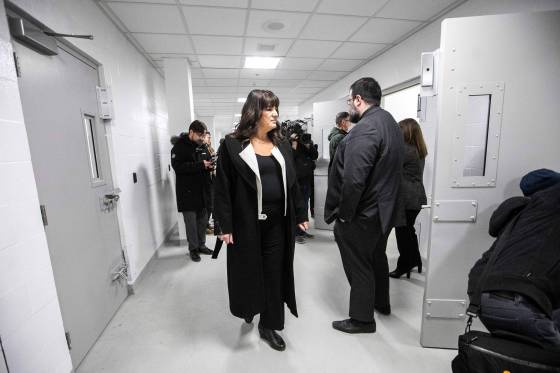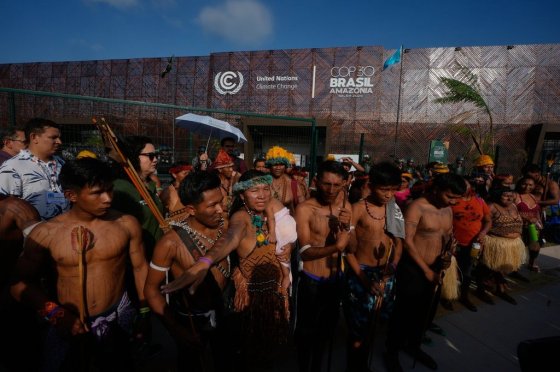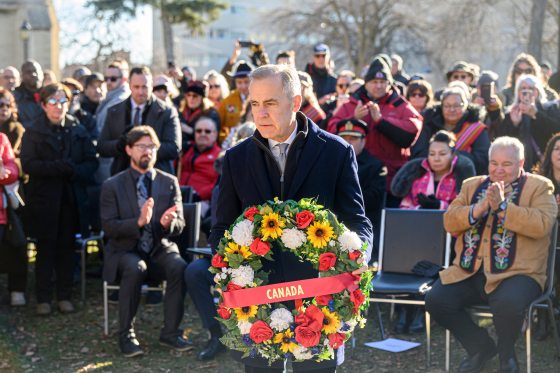FIVE STORIES ON TURTLE ISLAND
This week the province of Manitoba will open a new 20-suite detox centre in South Point Douglas that is being called a “different approach” to dealing with addiction by Housing, said Housing, Addictions and Homelessness Minister Bernadette Smith.
Operated by Main Street Project, the centre follows up the province’s somewhat controversial Protective Detention and Care of Intoxicated Persons Act, which was passed on Nov. 6.
It’s well known Indigenous addictions on reserves and in cities is a pressing and critical issue on the rise — something the province and Minister Smith have been focused on since their mandate. Time will tell whether this helps a neighbourhood like South Point Douglas deal with the issue.

Minister of Housing Bernadette Smith tours the new 20-suite detox centre in South Point Douglas. (Mikaela MacKenzie / Free Press)
Last week I wrote in this newsletter how Indigenous leaders forced their way into being heard at COP30, or the United Nations Climate Change Conference, taking place in Belém, Brazil.
It appears that some of this activism has worked, with the government of Brazil and President Luiz Inácio Lula da Silva announcing the creation of 10 new Indigenous territories.
Protected space for Indigenous communities, however, means very little in the country; police and military often do not enforce federal laws intended to protect Indigenous peoples, the primary reason of why Indigenous activists are protesting COP30 in the first place.
A very interesting case in B.C. was settled this week as TD Bank compensated an Indigenous-Muslim man who was refused service when applying for a bank account.
After using his Indian status card at the bank in Surrey, B.C., Sharif Mohammed Bhamji was turned away and told his ID was “fake,” with the bank later calling the police to report him.
After filing a Canadian Human Rights Commission complaint, the bank paid for a restorative justice ceremony, compensated Bhamji, and agreed to change its policies to ensure this instance of racial profiling does not occur again.
Congrats to my good friend Leanne Betasamosake Simpson for winning this year’s Hilary Weston Trust Prize for Nonfiction for her remarkable book Theory of Water: Nishnaabe Maps To the Times Ahead.
This is an incredible book; check out the author talking about it here.
The award comes with a $75,000 prize but the best part was Simpson’s speech, which gave credit to all of those who created footsteps for Simpson to walk in.
This week, instructed by Pope Leo XIV, the Vatican returned 62 Indigenous cultural items to Canada via the Canadian Council of Bishops, fulfilling a promise made earlier this year.
Taken (often forcibly, but also bought and traded) for a 1925 exposition on the Catholic church’s global reach, these items will now be handled by the Canadian Museum of History before a determination is made on what is to be done to investigate their origins and final destinations.
IN PICTURES

An Indigenous group blocks an entrance to the COP30 U.N. Climate Summit, Friday, Nov. 14, in Belem, Brazil. (Fernando Llano The Associated Press files)
RECONCILI-ACTION OF THE WEEK
Every week I highlight an action, moment, or milestone forwarding reconciliation, illustrating how far Canada has come — and how far the country has yet to go.
This week’s reconciliaction of the week is a bit of an odd one. This week 140 years ago, Louis Riel — who has now been officially recognized by the province of Manitoba as its first premier — was hanged after helping lead the 1885 North-West Resistance.
Riel’s hanging was a wrong that “haunts” this country as many Indigenous and Canadian thinkers have remarked and the leader’s execution is still commemorated annually by organizations, governments and citizens throughout Canada and the Manitoba Métis Federation.
This year, however, an interesting guest arrived and even laid a wreath at Riel’s gravesite: Canadian Prime Minister Mark Carney.
The Canadian federal government, of course, found Riel guilty of “high treason” and executed him — so to have a Canadian prime minister show up and say the Métis leader “helps to unite” Canada is somewhat a remarkable statement.

Prime Minister Mark Carney lays a wreath at Louis Riel’s grave to commemorate the 145th anniversary of Riel’s execution at the St. Boniface Cathedral cemetery on Sunday morning. (Mike Sudoma/Free Press)
At the moment of his execution, Riel said: “I am more convinced every day that without a single exception I did right. And I have always believed that, as I have acted honestly, the time will come when the people of Canada will see and acknowledge it.”
Apparently, he was right.
|

